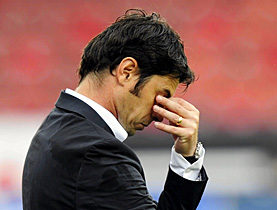Names of two clubs revealed in betting scandal

Details of Swiss teams' involvement in Europe's biggest football match-fixing ring have begun to emerge.
FC Thun – a second division team – suspended Senegalese striker Omar Faye from its match on Sunday against FC Winterthur, after he admitted being interrogated by police in connection with the affair.
The president of the club, Markus Stähli, said it was not yet known what role Faye played in the suspected fixing of a match between Thun and Yverdon earlier this year.
On April 26, according to Swiss newspaper reports, FC Thun players received €15,000 (SFr22,690) to lose by four goals. The game ended 5-1 for Yverdon. Thun’s goalkeeper Sascha Stulz was quoted after the match as saying he “often felt rather alone” at the back.
The NZZ am Sonntag newspaper based its report on statements by an attorney, Burkhard Benecken.
The German lawyer represents a suspected Turkish mastermind behind the match fixing, who has been in investigative custody in the German town of Wuppertal since Thursday.
Second-division club FC Gossau said on Monday that it had suspended midfielder Mario Bigoni indefinitely in connection with the match fixing affair.
High stakes
In another of the 22 Swiss games suspected of being manipulated, FC Gossau is said to have received €20,000 to lose by at least two goals to Locarno on May 24. Locarno won 4-0. The return on investment for the match fixers is believed to have been €149,000.
Both Stähli and the president of the Gossau club, Roland Gnägi, said they knew nothing of the affair before Friday’s announcement by German investigators that 17 people had been arrested, including two in Switzerland.
Gnägi said he feared that everyone involved with the Gossau club would now be considered suspect. He added that only two players who took the pitch against Locarno are still on the team today.
Both the Gossau and Thun matches took place before the Swiss league introduced a betting fraud detection system endorsed by Uefa, European football’s ruling body.
A Bosnian team, NK Travnik, has also been mentioned for matches it played against Swiss squads. A private radio station in canton Valais, Rhône FM, said Travnik financed its Swiss trip by intentionally losing 4-1 to local side, Sion. Asian betters allegedly profited from the result.
Swiss Football League
The Gossau president said he expects to receive more information about the ongoing investigation from the Swiss Football League on Monday. That is when the Federal Prosecutor will hold talks with league and Swiss Football Association officials.
And Europe’s ruling football body, Uefa, has invited officials from the leagues and associations to a meeting on Wednesday at its Swiss headquarters near Geneva.
Uefa has billed the affair as Europe’s worst ever match-fixing scandal.
Officials from an anti-fraud unit based in the German town of Bochum said those arrested were suspected of trying to manipulate the outcome of about 200 games in nine countries.
The group is facing charges of trying to bribe players, coaches, referees and other officials, and of running an international gambling ring that took bets from clients in Europe and Asia.
The officials refused to identify the people detained, or to say specifically which games were in question.
swissinfo.ch and agencies
Thun’s alleged role in the match-fixing scandal is not the first time players from the club have been scrutinised for suspect behaviour.
In 2007, when Thun was still in the first division, 12 players were detained on suspicion of having sex with a 15-year-old girl who was one of the club’s fans. The age of consent in Switzerland is 16.
Two of the men were found guilty.
Only two years earlier, FC Thun had been the darling of Swiss football. The low-budget squad not only qualified for the Champions League, but held their own against star-studded clubs like Arsenal.

In compliance with the JTI standards
More: SWI swissinfo.ch certified by the Journalism Trust Initiative











You can find an overview of ongoing debates with our journalists here . Please join us!
If you want to start a conversation about a topic raised in this article or want to report factual errors, email us at english@swissinfo.ch.